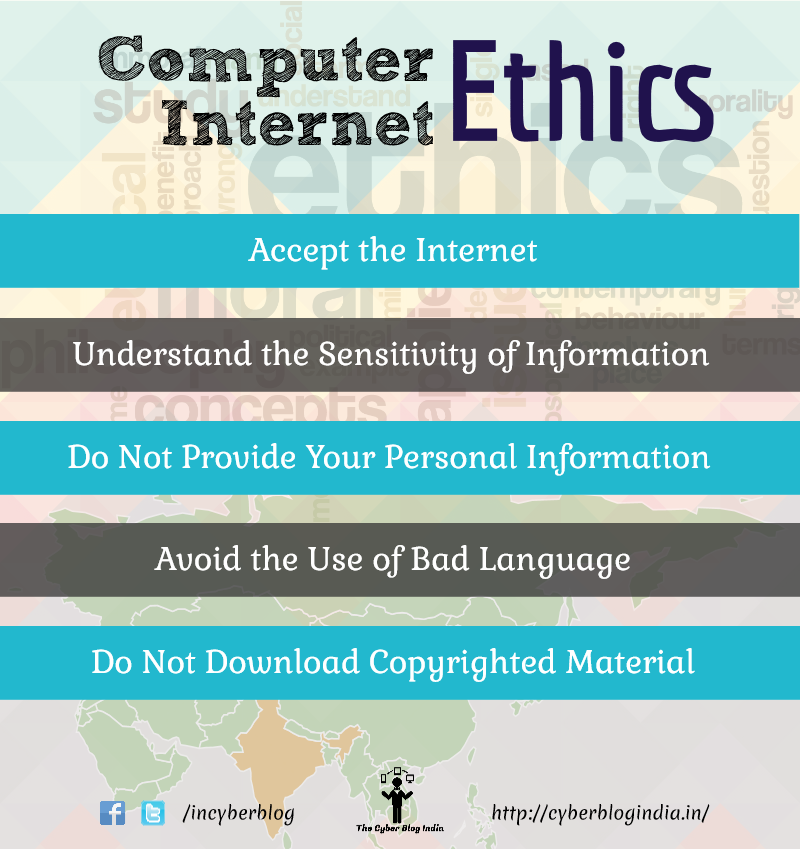Computer and Internet Ethics

When we talk about “ethics” we refer to attitudes, values, beliefs and habits possessed by a person or a group. The sense of the word is directly related to the term “morality” as Ethics is the study of morality.
Meaning of Computer Ethics
It is not a very old term. But until the 1960s, there was nothing known as “computer ethics”. Walter Maner in the mid-’70s introduced the term ‘computer ethics’ which means “ethical problems aggravated, transformed or created by computer technology”. Wiener and Moor have also discussed this in their book—“Computer Ethics identifies and analyses the impacts of Information Technology upon human values like Health, Wealth, opportunity, Freedom, democracy, knowledge, Privacy, security, Self-fulfilment, and so on…“. Since the 1990s, its importance has increased. In simple words, Computer ethics is a set of moral principles that govern the usage of Computers.
Issues
As we all know, the Computer is an effective technology. It can raise ethical issues like Personal Intrusion, Deception, Breach of Privacy, Cyber-bullying, Cyber-stalking, Defamation, Evasion Technology or social responsibility and Intellectual Property Rights i.e. copyrighted electronic content. Moreover, in a Computer or Internet (Cyberspace) domain of Information Security, understanding and maintaining ethics is very important at this stage. A typical problem related to ethics arises mainly because of the absence of policies or rules about how computer technology should be used. It is thus, high time that there is some strict legislation regarding the same in the country.
Basic Internet Ethics for Everyone
- Acceptance- We should accept that the Internet is a primary component of our society only and not something apart from it.
- We should understand the sensitivity of Information before writing it on the Internet as there are no national or cultural barriers.
- As we do not provide our personal information to any stranger, any personal information related to others should not be uploaded on a public network because it might be misused.
- Avoid the use of rude or bad language while using e-mail, chatting, blogging, and social networking. Respect the person on the other side.
- No copyrighted material should be copied, downloaded or shared with others.
Computer Ethics-the 10 commandments
Following are the 10 commandments as created by The Computer Ethics Institute which is a non-profit working in this area:
- Thou shall not use a computer to harm other people;
- Thou shall not interfere with other people’s computer work;
- Thou shall not snoop around in other people’s computer files;
- Thou shall not use a computer to steal;
- Thou shall not use a computer to bear false witness;
- Thou shall not copy or use proprietary software for which you have not paid;
- Thou shall not use other people’s computer resources without authorisation or proper compensation;
- Thou shall not appropriate other people’s intellectual output;
- Thou shall think about the social consequences of the program you are writing or the system you are designing;
- Thou shall always use a computer in ways that ensure consideration and respect for your fellow humans.
Computers and the Internet both are time-efficient tools for everyone. It can enlarge the possibilities for your curriculum growth. There is a lot of information on the Internet that can help you in learning. Therefore, explore that Information instead of exploiting others.
To read this article in Hindi, click here. | इस लेख को हिंदी में पढ़ने के लिए यहाँ क्लिक करें।
